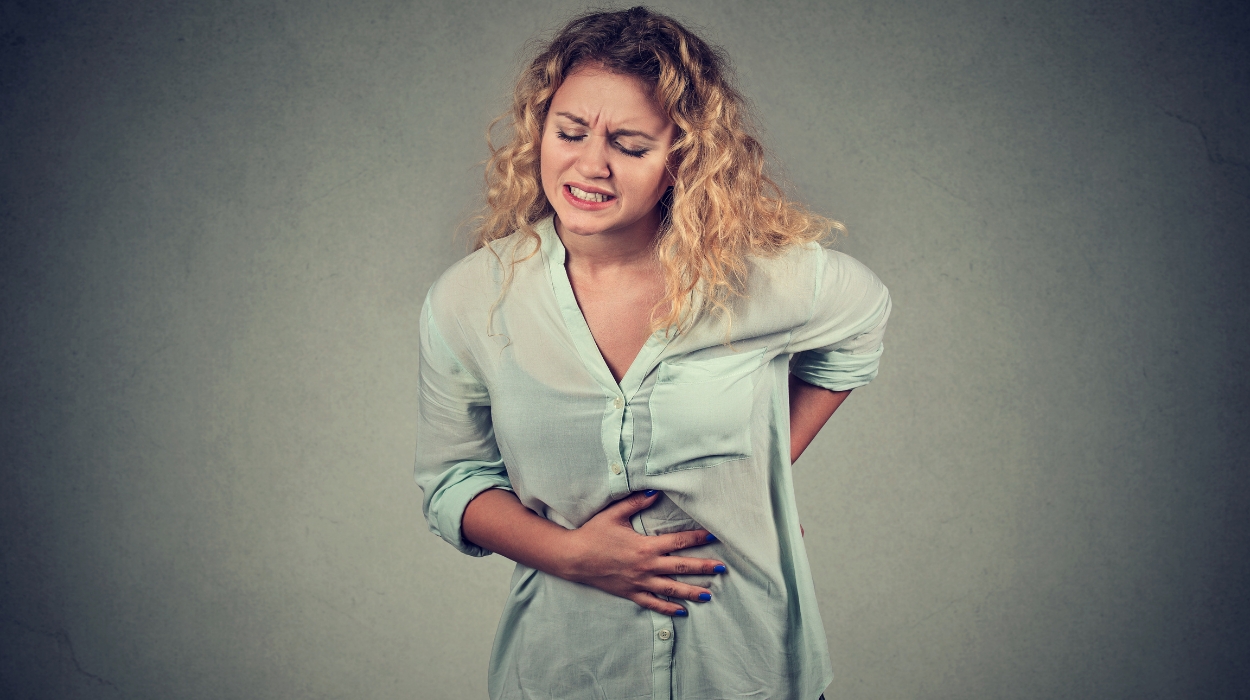Gas. We all have it, but sometimes it can cause more than a little discomfort. Did you know that trapped gas can cause back pain?
In this article, we will explore the connection between gas and back pain, and more importantly, we will provide you with effective ways to find relief. So, if you’ve been suffering from back pain and suspect that gas may be the culprit, keep reading to discover how you can finally find comfort.
Can Trapped Gas Cause Back Pain?
Gas is a natural byproduct of digestion. When we eat and drink, we can inadvertently swallow air. This air can get trapped in our digestive system, leading to discomfort and bloating. In some cases, this trapped gas can radiate to other parts of the body, including the back.
While it may not be the most common cause of back pain, it is certainly a possibility worth considering, especially if you are experiencing other symptoms such as bloating, belching, or flatulence.
Causes Of Abdominal Pain And Back Pain

Understanding the causes of abdominal pain and back pain is crucial in identifying whether gas may be the culprit. There are several medical conditions that can contribute to both abdominal and back pain. Let’s explore some of the most common ones:
Irritable Bowel Syndrome
Irritable Bowel Syndrome (IBS) is a chronic condition that affects the digestive system. Some common symptoms of IBS are:
- Chronic pain in the abdomen.
- Bloating.
- Abnormal bowel movements such as constipation, diarrhea, or both.
- White mucus in stool.
- Bowel movements feeling unfinished.
Though researchers do not know the exact cause of IBS, they believe it’s related to a combination of factors, including abnormal muscle contractions in the intestines, oversensitivity to pain, and disturbances in the gut-brain axis. These chronic intestinal diseases can lead to both abdominal and back pain.
If you believe IBS is the cause of your back or abdominal pain, you should consult with a medical professional for treatment.
Kidney Stones
Kidney stones are hard masses of calcium that form in the kidneys. They can cause severe pain as they pass through your urinary tract. Kidney stones can sometimes cause referred pain, meaning the pain is felt in a different area of the body than where the stone is located.
Symptoms of kidney stones include:
- Blood in the urine.
- Sharp back pain, abdominal pain,
- Urinary pain.
- Abdominal or stomach pain.
- Difficulty urinating.
- Frequent urge to urinate.
- Poorly smelling or cloudy urine.
Kidney stones can have similar symptoms to other urinary tract diseases as well. If you suspect that your back pain is due to kidney stones, kidney infections, or urinary tract infections, you should consult with a medical professional.
Herniated Discs
Herniated discs occur when the soft cushioning between the vertebrae in the spine ruptures and presses on nearby nerves. Medical professionals also refer to herniated discs as “slipped discs,” “ruptured discs,” or “bulged discs.”
The symptoms of herniated discs include:
- Low aching in the back.
- Sharp back pain.
- Numbness in the back.
- Burning or tingling in the back.
- A lengthy history of back pain.
If you experience severe symptoms or mild pain lasting longer than six weeks, you should seek the help of a medical professional for diagnosis and treatment.
Diagnosing Back Pain
If you suspect gas may be causing your back pain, you might consider making an appointment with a healthcare professional for a proper diagnosis. A doctor can evaluate your symptoms, perform any necessary tests, and rule out other potential causes of your discomfort.
Some standard diagnostic methods for back pain include physical examinations, imaging tests such as X-rays or MRIs, and laboratory tests to check for any underlying conditions.
You should consult with a medical professional immediately if you experience:
- Severe pain.
- Fever.
- Muscle weakness or loss of strength.
- Pain that occurs after trauma to the back or body.
- Unexpected weight loss.
- Poor control of your bowels or bladder.
How To Relieve Gas Pain In Your Back?

Now that we have established the connection between gas and back pain let’s explore some practical ways to find relief. These methods can help alleviate discomfort and stomach bloating, and provide you with the comfort you’ve been seeking.
Exercise And Massage
Exercise and abdominal massage can help relieve gas pain in your back by promoting proper digestion and releasing trapped gas.
When you participate in gentle exercises, such as walking or riding a bike, gas moves through your digestive system more easily. Research shows that exercise prevents gas retention in the gut, which prevents the common symptoms associated with gas, such as back pain.
Additionally, massaging the abdomen and lower back can provide relief by promoting relaxation, stimulating bowel movement, preventing constipation, and improving circulation in the area.
Over The Counter Medications
Over-the-counter (OTC) medications can also be effective in relieving gas pain. Some common medications include:
- Antacids containing simethicone, such as Gas-X, can help break up gas bubbles in the digestive tract, reducing discomfort.
- Medications containing Alpha-galactosidase, such as Beano, aid your body in the digestion of carbohydrates to reduce excess gas production.
- Lactase supplements, such as Lactaid, prevent gas symptoms associated with lactose intolerance.
- Activated charcoal, such as Actidose-Aqua, might also reduce gas symptoms, though more empirical research is needed to determine effectiveness. It’s important to remember that activated charcoal can interfere with some medications.
You should consult with a healthcare professional before taking any new medications to determine if they are safe and appropriate for your situation. Discuss with a healthcare provider to ensure the medications do not interfere with any medications you are currently taking and that your symptoms are not stemming from a more serious condition.
Heat Therapy
Applying heat to the back or abdomen can provide soothing relief from gas pain in your back. A heating pad or warm compress can help relax the muscles, increase blood flow to the region, and promote the release of trapped gas.
The improved blood flow and muscle relaxation provide the digestive tract with a better environment for healthy bowel movements, which are essential for preventing gas buildup.
Simply apply the heat to the painful area for 10-15 minutes at a time, and repeat as needed. Follow the manufacturer’s instructions and avoid applying heat directly to the skin to prevent burns.
Home Remedies For Back Pain
In addition to the methods mentioned above, several home remedies can help alleviate both gas and back pain. These remedies are easy to implement and can provide effective relief:
- Peppermint tea: Peppermint has natural antispasmodic properties. It promotes muscle relaxation and prevents muscle spasms that can cause pain and discomfort.
- Ginger: Ginger is well-known for its digestive benefits. It can help reduce bloating, gas, and inflammation in the digestive system.
- Probiotics: Probiotics are beneficial bacteria that can help restore the balance of your gut flora and improve digestion.
How Long Do Back Pain & Abdominal Bloating Last?
The duration of back pain and abdominal bloating caused by gas can vary depending on the individual and the underlying cause. Symptoms will usually subside within a few hours to a few days with proper treatment and lifestyle adjustments.
However, if your symptoms persist or worsen, it is crucial to seek medical attention to rule out any other potential causes or underlying conditions.
Conclusion
Gas can indeed cause back pain, and understanding the connection between the two is crucial in finding relief. By identifying the underlying causes of your discomfort and implementing the strategies outlined in this article, you can finally find the comfort you’ve been seeking.
Remember to consult with a healthcare professional for an accurate diagnosis and ensure the most appropriate treatment for your situation. Say goodbye to the discomfort and embrace a life without gas-related back pain.
Frequently Asked Questions
If you experience back pain and think it might be caused by gas buildup you probably have some questions. Learn the answers to common questions about gas and back pain:
Yes, trapped gas can cause low back pain. When gas becomes trapped in the digestive system, it can radiate to other parts of the body, including the lower back, causing discomfort and pain.
There are several ways to relieve gas symptoms, including exercise and massage, taking over-the-counter medications, applying heat therapy, and trying home remedies like peppermint tea, ginger, or probiotics.
The duration of gas-related back pain can vary, but symptoms usually subside within a few hours to a few days with proper treatment and lifestyle adjustments. If symptoms persist or worsen, it is important to seek medical attention.
If you experience severe pain, a persistent fever, muscle weakness, pain that arises after a traumatic event or injury to the back or body, unexpected weight loss, or difficulty controlling your bowels or bladder, it is crucial to consult with a healthcare provider.
